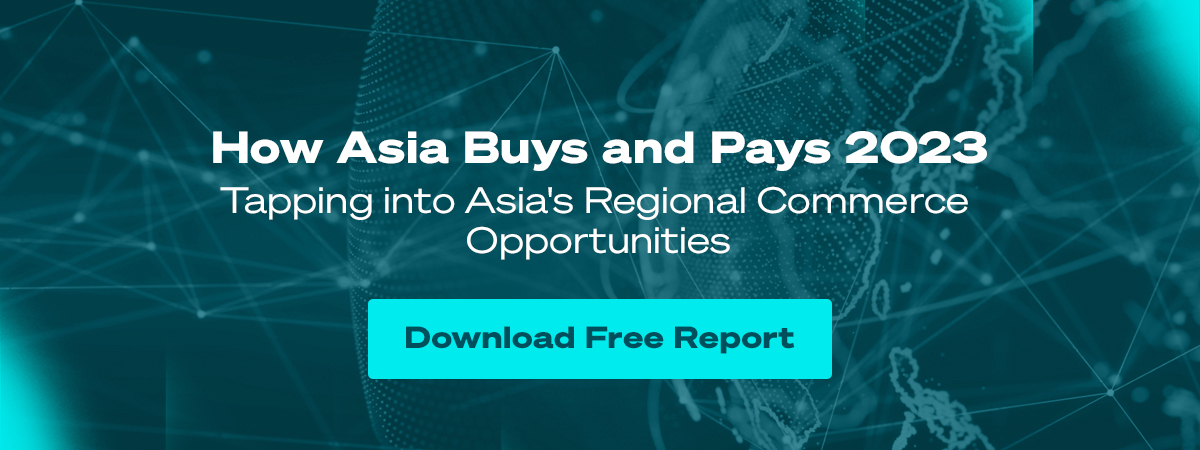
Payments Powerhouses: Driving Fintech Forward in ASEAN
Lee-Ling Chow, Business Development Manager at Amazon Web Services (AWS) for ASEAN, supports fintech (financial technology) startups with business introductions and roadmap planning as they grow and scale on AWS.
She honed her expertise in fintech for over a decade, where she worked on the development of a mobile wallet for one of Singapore’s leading telecommunications companies, created product partnerships between mobile wallets in emerging markets and a commercial bank, and launched APAC markets for a payments company.
Hi Lee-Ling! Let’s get the ball rolling - tell us about your journey into fintech.
Lee-Ling: My journey started about 10 years ago, when I explored ways to tap into the financial services space for a telco. It was here that I first built my fintech knowledge and network. Since then, I got the opportunity to work with a bank to help corporate enterprises transact with the unbanked and underbanked. I also spent some time working with a fast-growing payments company before joining AWS.
Would you mind sharing more about your role at AWS?
I took on this role because of two things. Firstly, I am very passionate about fintech and firmly believe that they will accelerate improvements in the financial ecosystem to level the playing field for everyone. Secondly, I value the opportunity AWS has given me. I admire AWS tremendously, especially its use of customer-driven principles and long-term thinking for product creation.
As the ASEAN Head of Fintech Business Development Division at AWS, I help fintechs grow and scale on AWS’ platform in this region. This encompasses a variety of things. For one, we act as business advisors by sharing best practices and trends from different regions, as well as help fintechs go to market by connecting them with key figures in the industry.
Sometimes we do a deep dive into the fintech’s business via workshops or consultative sessions to identify areas of improvement via cloud technology. For example, we could suggest using Artificial Intelligence / Machine Learning (AI/ML) to create new products, improve existing features, and automate internal processes.
How has the fintech and payments landscape in ASEAN transformed over the years? What trends have caught your eye?
It’s an exciting time for fintechs, and this is reflected in the ever-increasing amount of VC funding that has been coming into this vertical. CB Insights research showed that after e-commerce, fintech is the top funded vertical with $7.5 billion raised, a 232% increase year-on-year as of Q3 2021. The technology has become tremendously sophisticated over time.
Many early ASEAN fintechs started off with online payments and remittance services to provide a better user experience compared to traditional banking. But as technology evolved, these fintechs adapted accordingly to develop services that are much more mainstream and consumer-friendly. More recent examples include Buy Now Pay Later (BNPL) and the liberalisation of investment and insurance products for the masses – we now have startups who are enabling the purchase of equities and investment products at as little as a few dollars, which I think is a fantastic step towards financial inclusion and wealth-building in emerging markets.
The most interesting trend I’ve seen is embedded finance, which is still in its early stages in ASEAN. I think of it as how non-financial companies are integrating financial services into their products or user experience to create engagement. For example, a life insurance company may issue a spending card that allows customers to spend down their policy entitlements. This opens up opportunities for daily interactions and upselling, as well as drives an uptick in social data. It's a vast improvement from when insurance companies only interacted with their policyholders twice: when they purchased policies and when the policy ended.
We also see more fintechs providing application programming interfaces (APIs) to embed their products into other companies’ websites easily. Once this fully takes off, we’ll truly become a world where “every company is a fintech”, like what Angela Strange from a16z had described.
What are the key drivers behind the embedded finance trend?
Essentially, traditional financial services have been broken down into many pieces and picked up by various fintechs, and this has enabled specialisation and modernisation of business practices that are working backwards from customer needs. For example, nowadays any company - even if it’s not strictly a fintech - can issue a virtual card to their customers’ phones instantly with an API call.
This is dramatically different from the past, where the company must find a traditional bank to sign a co-branded commercial deal first, and card issuance to consumers is a batch process that takes weeks before the consumer can start transacting. Effectively, everything is now condensed and whittled down into a single API call, making things so much easier and quicker – and this is really driven by the fact that customers demand a much quicker turnaround time. We see now that increasingly, more companies are getting into financial services as their customers prefer the embedded finance model.
What opportunities are there for embedded finance in ASEAN markets?
First and foremost, payments and views towards money are very cultural. Even though people like to group Southeast Asian countries under the ASEAN umbrella, every country has its own preferences. The most successful companies respect these nuances.
With embedded finance, financial services are liberated; the services provided by a traditional bank can now be served by a group of fintechs, with everything condensed into API calls. As a result, fintechs in emerging markets can launch and scale much faster, creating their Minimum Viable Product (MVP) and reaching their next funding milestone at a quicker pace. We have seen this being reflected in the bigger (1.5x to 2x) Seed/Series A rounds across the globe, as per Crunchbase data.
With AWS, everything can be ready within a day or even in a few hours. Similarly, with embedded finance you don’t need to know everything about payments - just some API calls and you’re ready to start experimenting and building an MVP. We see a lot of this in emerging markets as fintechs there are empowered to grow much quicker.
While it’s a lot easier to build a fintech company today, regulations remain. Just because a fintech can make an API call to issue a card doesn’t mean that it can simply distribute cards to anyone. Trust is hard to earn, yet easy to lose. As fintechs grow to scale, they need to earn and maintain the trust of the regulators in the countries where they operate. That is why fintechs need to pay attention to regulations and compliance.
What is your advice for merchants exploring mobile wallets and other alternative payment methods as part of their services?
Before launching a wallet, be familiar with local regulations around stored value facilities. Merchants should also have a clear reason for setting up a wallet. Whether it is to foster customer loyalty or upselling, merchants need to be focused and not lose sight of their objective because it can be tempting to do a lot of things but end up not achieving core business outcomes.
Why do businesses choose AWS over other companies?
I would say that AWS’s customer obsession is what sets it apart from most other technology companies. As a rough gauge, 90% of what we build at AWS is driven by what our customers want, and the remaining 10% is derived from our customers’ unspoken needs which we have to deduce by reading between the lines of what they verbally tell us. We are really focused on working backwards from our customers – it is a core principle within the Amazon business.
Second, AWS is a pioneer in the cloud service provider business. We are discerning with the companies we form partnerships with, recognising the most attractive companies have the most functionality, iterate the fastest, boast the largest communities, and plan to use the cloud from the start without acquisitions.
AWS is also a company with really long-term thinking. We seek to maintain relationships with our customers for a long time. You will never catch us showing up at our customers’ doorsteps only at the end of the quarter or at the end of the year - we need to be there for them at all times. We have surprised customers by working with them to reduce their cloud spend proactively, which is relatively uncommon and probably even strange if you think about it – but we do this because we are long-term thinkers.
What are the three main ways AWS ensures that financial services institutions under its purview adhere to security standards?
Security is top priority at AWS. AWS is built to be the most flexible and secure cloud computing environment today, with our core infrastructure adhering to security requirements for the military, global banks, and other highly sensitive organisations. This infrastructure is backed by a comprehensive set of cloud security tools, along with security, compliance, governance services and key features.
We maintain a shared responsibility model with our customers. While AWS manages and controls the host operating system, virtualisation layers, and the security of physical facilities, our customers are in charge of building applications securely. To help our customers adhere to this model, we provide them with a complete suite of security tools, and these include best practices documents, network security, configuration management, access control, and data encryption.
Lastly, AWS operates at a large enough scale globally to invest heavily in security policing and countermeasures. Companies can leverage tools like AWS Config and resource tagging to see all the cloud assets their companies use at a glance, making it much easier to manage their environment.
How has COVID-19 impacted financial services partners and customers?
COVID-19 jumpstarted digitalisation in many industries, advancing society and economy in the process.
When lockdowns and uncertainty were rampant at the start of the pandemic, funding levels dropped significantly and many fintechs had to reduce their burn rate. However, as business shifted online, payment fintechs saw a growing demand for digital payment solutions. From ordering food and buying groceries to government services, all these services are connected by one common point: they all require digital payments.
The same goes for traditional financial institutions like banks. In the past, bank account opening, and many other banking services had to be done in-person at physical branches. COVID-19 effectively compelled banks to adopt digitalisation and online services faster, thereby accelerating some of the investment cycles that would have taken longer to implement.
What is the biggest takeaway in your time with AWS, and what do you hope to achieve as you advance your career?
I consider myself to be in a very fortunate position, as my job at AWS allows me to speak to so many exciting companies all the time. My biggest takeaway is that behind the shiny veneer of a unicorn lies an extremely dedicated team who has had a near-maniacal focus on creating the best product for a clearly-defined customer segment. Running a fintech is gritty hard work, but there’s just so much opportunity to be mined in this space.
As I continue to advance my career, I’d love to start something myself beyond AWS. Nevertheless, there is one thing I’ve learnt at AWS that I’d always bring along with me – having the Day 1 mindset. This means that every day you are not simply sitting stagnant on the information you had at the start but continue to build on what you’ve learned and evolve, making quick decisions and having a curiosity to unlearn and relearn because it is just Day 1 of the rest of your journey.
. . .
Payments Powerhouses is a monthly editorial series interviewing the movers and shakers of the payments and wider fintech industry, in Southeast Asia and beyond. If you’d like to be featured on Payments Powerhouses, reach out to us here.

